I have a class responsible for downloading files in a download manager. This class is responsible for downloading the file and writing it to the given path.
The size of the files to download varies normally from 1 to 5 MB but could also be much larger. I'm using an instance of the WebClient class to get the file from the internet.
public class DownloadItem
{
#region Events
public delegate void DownloadItemDownloadCompletedEventHandler(object sender, DownloadCompletedEventArgs args);
public event DownloadItemDownloadCompletedEventHandler DownloadItemDownloadCompleted;
protected virtual void OnDownloadItemDownloadCompleted(DownloadCompletedEventArgs e)
{
DownloadItemDownloadCompleted?.Invoke(this, e);
}
public delegate void DownloadItemDownloadProgressChangedEventHandler(object sender, DownloadProgressChangedEventArgs args);
public event DownloadItemDownloadProgressChangedEventHandler DownloadItemDownloadProgressChanged;
protected virtual void OnDownloadItemDownloadProgressChanged(DownloadProgressChangedEventArgs e)
{
DownloadItemDownloadProgressChanged?.Invoke(this, e);
}
#endregion
#region Fields
private static readonly Logger Logger = LogManager.GetCurrentClassLogger();
private WebClient _client;
#endregion
#region Properties
public PlaylistItem Item { get; }
public string SavePath { get; }
public bool Overwrite { get; }
#endregion
public DownloadItem(PlaylistItem item, string savePath, bool overwrite = false)
{
Item = item;
SavePath = savePath;
Overwrite = overwrite;
}
public void StartDownload()
{
if (File.Exists(SavePath) && !Overwrite)
{
OnDownloadItemDownloadCompleted(new DownloadCompletedEventArgs(true));
return;
}
OnDownloadItemDownloadProgressChanged(new DownloadProgressChangedEventArgs(1));
Item.RetreiveDownloadUrl();
if (string.IsNullOrEmpty(Item.DownloadUrl))
{
OnDownloadItemDownloadCompleted(new DownloadCompletedEventArgs(true, new InvalidOperationException("Could not retreive download url")));
return;
}
// GCSettings.LargeObjectHeapCompactionMode = GCLargeObjectHeapCompactionMode.CompactOnce;
using (_client = new WebClient())
{
_client.Headers.Add("user-agent", "Mozilla/4.0 (compatible; MSIE 6.0; Windows NT 5.2; .NET CLR 1.0.3705;)");
try
{
_client.DownloadDataCompleted +=
(sender, args) =>
{
Task.Run(() =>
{
DownloadCompleted(args);
});
};
_client.DownloadProgressChanged += (sender, args) => OnDownloadItemDownloadProgressChanged(new DownloadProgressChangedEventArgs(args.ProgressPercentage));
_client.DownloadDataAsync(new Uri(Item.DownloadUrl));
}
catch (Exception ex)
{
Logger.Warn(ex, "Error downloading track {0}", Item.VideoId);
OnDownloadItemDownloadCompleted(new DownloadCompletedEventArgs(true, ex));
}
}
}
private void DownloadCompleted(DownloadDataCompletedEventArgs args)
{
// _client = null;
// GCSettings.LargeObjectHeapCompactionMode = GCLargeObjectHeapCompactionMode.CompactOnce;
// GC.Collect(2, GCCollectionMode.Forced);
if (args.Cancelled)
{
OnDownloadItemDownloadCompleted(new DownloadCompletedEventArgs(true, args.Error));
return;
}
try
{
File.WriteAllBytes(SavePath, args.Result);
using (var file = TagLib.File.Create(SavePath))
{
file.Save();
}
try
{
MusicFormatConverter.M4AToMp3(SavePath);
}
catch (Exception)
{
// ignored
}
OnDownloadItemDownloadCompleted(new DownloadCompletedEventArgs(false));
}
catch (Exception ex)
{
OnDownloadItemDownloadCompleted(new DownloadCompletedEventArgs(true, ex));
Logger.Error(ex, "Error writing track file for track {0}", Item.VideoId);
}
}
public void StopDownload()
{
_client?.CancelAsync();
}
public override int GetHashCode()
{
return Item.GetHashCode();
}
public override bool Equals(object obj)
{
var item = obj as DownloadItem;
return Item.Equals(item?.Item);
}
}
Every download causes a very large memory increase compared with the file size of the downloaded item. If I download a file with a size of ~3 MB the memory usage is increasing about 8 MB.
As you can see the download is producing much LOH which is not cleared after the download. Even forcing the GC or the setting GCSettings.LargeObjectHeapCompactionMode = GCLargeObjectHeapCompactionMode.CompactOnce; is not helping to prevent this memory leak.
Comparing Snapshot 1 and 2 you can see that the amount of memory is produced by byte arrays which might be the download result.
Doing several downloads shows how terrible this memory leak is.
In my opinion this is caused by the WebClient instance in any way. However I can't really determine what exactly is causing this issue. It doesn't even matters if I force the GC. This screen here shows it without forced gc:
What is causing this overheat and how can I fix it? This is a major bug and imagining 100 or more downloads the process would run out of memory.
Edit
As suggested I commented out the section responsible for setting the tags and converting the M4A to an MP3. However the converter is just a call of FFMPEG so it shouldn't be a memory leak:
class MusicFormatConverter
{
public static void M4AToMp3(string filePath, bool deleteOriginal = true)
{
if(string.IsNullOrEmpty(filePath) || !filePath.EndsWith(".m4a"))
throw new ArgumentException(nameof(filePath));
var toolPath = Path.Combine("tools", "ffmpeg.exe");
var convertedFilePath = filePath.Replace(".m4a", ".mp3");
File.Delete(convertedFilePath);
var process = new Process
{
StartInfo =
{
FileName = toolPath,
#if !DEBUG
WindowStyle = ProcessWindowStyle.Hidden,
#endif
Arguments = $"-i \"{filePath}\" -acodec libmp3lame -ab 128k \"{convertedFilePath}\""
}
};
process.Start();
process.WaitForExit();
if(!File.Exists(convertedFilePath))
throw new InvalidOperationException("File was not converted successfully!");
if(deleteOriginal)
File.Delete(filePath);
}
}
The DownloadCompleted() method looks now like this:
private void DownloadCompleted(DownloadDataCompletedEventArgs args)
{
// _client = null;
// GCSettings.LargeObjectHeapCompactionMode = GCLargeObjectHeapCompactionMode.CompactOnce;
// GC.Collect(2, GCCollectionMode.Forced);
if (args.Cancelled)
{
OnDownloadItemDownloadCompleted(new DownloadCompletedEventArgs(true, args.Error));
return;
}
try
{
File.WriteAllBytes(SavePath, args.Result);
/*
using (var file = TagLib.File.Create(SavePath))
{
file.Save();
}
try
{
MusicFormatConverter.M4AToMp3(SavePath);
}
catch (Exception)
{
// ignore
}
*/
OnDownloadItemDownloadCompleted(new DownloadCompletedEventArgs(false));
}
catch (Exception ex)
{
OnDownloadItemDownloadCompleted(new DownloadCompletedEventArgs(true, ex));
Logger.Error(ex, "Error writing track file for track {0}", Item.VideoId);
}
}
The result after downloading 7 items:
 It seems like this was not the memory leak.
It seems like this was not the memory leak.
As an addition I'm submitting the DownloadManager class too as it is handling the whole download operation. Maybe this could be the source of the problem.
public class DownloadManager
{
#region Fields
private static readonly Logger Logger = LogManager.GetCurrentClassLogger();
private readonly Queue<DownloadItem> _queue;
private readonly List<DownloadItem> _activeDownloads;
private bool _active;
private Thread _thread;
#endregion
#region Construction
public DownloadManager()
{
_queue = new Queue<DownloadItem>();
_activeDownloads = new List<DownloadItem>();
}
#endregion
#region Methods
public void AddToQueue(DownloadItem item)
{
_queue.Enqueue(item);
StartManager();
}
public void Abort()
{
_thread?.Abort();
_queue.Clear();
_activeDownloads.Clear();
}
private void StartManager()
{
if(_active) return;
_active = true;
_thread = new Thread(() =>
{
try
{
while (_queue.Count > 0 && _queue.Peek() != null)
{
DownloadItem();
while (_activeDownloads.Count >= Properties.Settings.Default.ParallelDownloads)
{
Thread.Sleep(10);
}
}
_active = false;
}
catch (ThreadInterruptedException)
{
// ignored
}
});
_thread.Start();
}
private void DownloadItem()
{
if (_activeDownloads.Count >= Properties.Settings.Default.ParallelDownloads) return;
DownloadItem item;
try
{
item = _queue.Dequeue();
}
catch
{
return;
}
if (item != null)
{
item.DownloadItemDownloadCompleted += (sender, args) =>
{
if(args.Error != null)
Logger.Error(args.Error, "Error downloading track {0}", ((DownloadItem)sender).Item.VideoId);
_activeDownloads.Remove((DownloadItem) sender);
};
_activeDownloads.Add(item);
Task.Run(() => item.StartDownload());
}
}
#endregion



